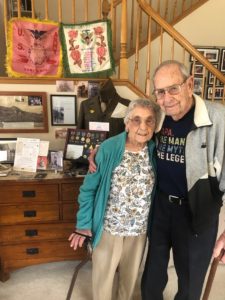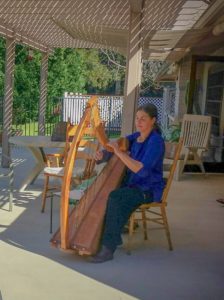
by Maryssa Rillo
Donald Knapp, a Ventura local who served as a tank commander in World War II, celebrated his 100th birthday on Sunday, April 20th, 2019.
Knapp served in the military for three years and was in combat for 11 months during World War II. At first, Knapp tried to avoid combat, but was unable to do so and was called to be a gunner.
“I went on to Fort Knox and I was supposed to be the radio man back at headquarters, stay out of combat, but it turned out some of the gunners didn’t physically make it,” Knapp said. “They said, ‘you are now the gunner in Montoya’s tank.’”
Knapp then went overseas to fight in combat against the Germans. On July 11th, 1944, when trying to take Hill 122 from the enemy, Knapp barely escaped death.
“Our lieutenant decided he would go without the infantry, which you need to get out in front to see what’s happening. Four of the five tanks I was in got knocked out, whoops. But we had a little mechanical trouble and missed the last part, so I survived,” Knapp said.
Once Knapp returned to the states, he went back to being what they called a “shack rat.” This meant he would go into town every night to see his wife. The army again had different plans for Knapp and assigned him as a tank commander. Without any previous experience, Knapp was forced to learn on the job.
“Well you know there’s people shooting at ya. I determined that our tanks were not as good as the Germans. They had better fire power and what not. By that time, I was 25 and I was considered a little bit old. I was getting younger kids for my tank and I thought first thing is to protect the kids,” Knapp said.
Knapp was diagnosed with tonsillitis and was sent to the hospital. Though this seemed to be unfortunate, Knapp escaped death once again.
“They sent me back to the hospital to bring my temperature down and all that. Meanwhile, someone took over my tank. That tank got knocked off and the tank commander got killed. That should have been me,” Knapp said. “Some of the guys said, ‘Don Knapp got out of it again.’”
At one point, Knapp was an in area called Mairy, which was further into France. While on guard one night, the Germans shot up their headquarters. Knapp said they took evasive action and while on a hill the tank next to him was shot with an armor piercing from a German Panther. Knapp immediately got his crew out of there.
“We evaded action and we were waiting on the side of the road. Here came a Panther tank right on the side of us and our armor would not pierce the front of that tank, but we could catch it from the side. So, we all nailed them. It felt good that we got a superior tank out,” Knapp said.
Knapp said that fighting in combat changed him and he returned from war not the man he used to be.
“You’d see all these malfunctions and you wish it could have been different because I saw a lot of people killed and it always stays with you,” Knapp said.
Knapp said that the secret to living such a long life is “the love of a beautiful woman.”
Knapp said that Evelyn, his wife of 77 years, wrote to him every single day while he was in combat.
“I used to write to him every single day even if it was just a little. Who was doing what, and who I saw,” said Evelyn Knapp.
Evelyn Knapp was able to stay with Donald while he was in Fort Knox but she said that it was hard when he was away.
“I would have to tell you that being together all these years, she made my life,” Donald Knapp said.
